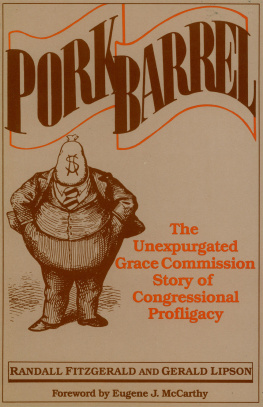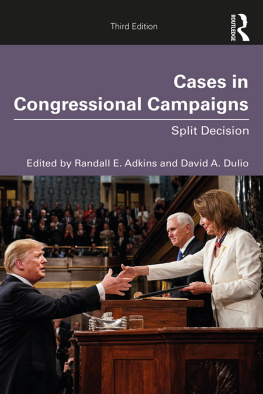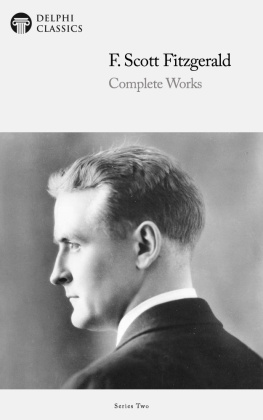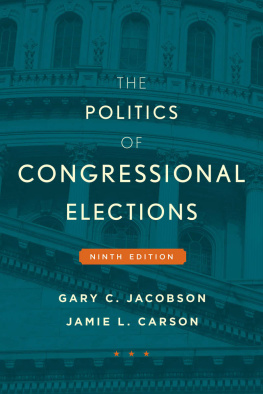PORK
BARREL
PORK
BARREL
The Unexpurgated Grace Commission Story of Congressional Profligacy
RANDALL FITZGERALD AND GERALD LIPSON
This book was made possible by a grant
from the Scaife Family Charitable Trusts.
INSTITUTE
Copyright 1984 by the Cato Institute.
All rights reserved.
Library of Congress Cataloging in Publication Data
Fitzgerald, Randall.
Porkbarrel: the unexpurgated Grace Commission story of congressional profligacy.
Administrative agenciesUnited States.
2. United States-Executive departments. 3. United States. Congress. 4. Waste in government spendingUnited States. 5. President's Private Sector Survey on Cost Control (U.S.) I. Lipson, Gerald, 1935 II. Title.
JK585.F58 1984 353.04 84-21493
ISBN 0-932790-44-5
Printed in the United States of America.
This report was originally prepared under the title "The Cost of Congressional Encroachment."
C ATO I NSTITUTE
224 Second Street SE
Washington, D.C. 20003
Foreword
Eugene J. McCarthy
This report is in some cases oversimplified; undoubtedly some things are not in full context. Extenuating circumstances, in some instances, have gone unrecognized and unreported. Despite the report's focus on congressional profligacy, it gives members of Congress, especially those named in the report, grounds for protesting that executive and bureaucratic profligacy is as bad as their own, if not worse. However, taken as a whole, the report is not only defensible but also commendable. Its authors and publishers deserve special credit for providing names of members of Congress primarily responsible for particularly wasteful and self-interested expenditures, and especially for noting that some of the persons so named have built or sought to build reputations as guardians of the public purse. The authors suggest that the reputation of some of the economizers is a "Never on Sunday" reputation and applies only to expenditures for projects and programs outside the member's own district or state.
Some members of Congress clearly employ a double standard regarding projects of questionable economic justificationone standard for application at home, and another for the rest of the country. Their political opponents, the state or local press, and even the local Chamber of Commerce are likely to exhibit the same inconsistency by declaring their own commitments to frugality and austerity, in general, but denouncing incumbents for failing to protect or advance special interests of the state or district.
The book also deals successfully with wastefulness in the context of historical and traditional practices, and with the institutional and, in some cases, statutory encouragement of waste. The classic and clearest demonstration of the interworking of traditional, institutional, and personal political interests is found in the portion of the book dealing with water policy and projects. Members of Congress like to give their constituency tangible evidence of the effectiveness of their representation: a new Post Office, a veterans' hospital, a government office building, a government contract, a road, a bridge. But no project seems to be as intensely sought after as a water project. Even though a congressional rule states that no project can be named after a living politician, there is always the possibility that such a project can later be renamed and live on in history as a dam, lock, or canal carrying the name of a deceased member of Congress, or perhaps one who is retired and has passed the biblically allotted three score years and ten. Such temptations all too often are too much for austerity-minded members to bear, and their judgment is all too frequently fogged by the illusion of immortality thus obtained.
Congressional power over water projects began with the authorization of the first Rivers and Harbors Act in 1824. That power, although shared minimally with the executive branch, has been assiduously guarded by Congress. President Carter, a stranger to Washington, discovered this soon after his inauguration when he announced his intention to eliminate some 18 water projects from the Public Works Appropriation Bill. One of the projects was the Central Arizona Project. I was in Arizona at the time of the announcement and noted that despite the president's statement, the bulldozers and other earth-moving equipment continued to operate as if no presidential announcement had been made. The workers either had not heard of the president's opposition or had ignored it. In either case, they were right: The project continued.
Another voice bearing on the success of Congress in pushing water projects is that of the Army Corps of Engineers, which over the years has established a mutually beneficial relationship with Congress. The corps has aided Congress in obtaining approval of projects, and in turn has been assisted in its need for continuous work in lowering mountains, raising valleys, deepening the rivers, drying up swamps, and generally making "straight the way of the Lord." It has been suggested that the corps be given responsibility for nuclear power plant construction, supervision, and waste disposal (if that be possible), so as to give it something to do, and thereby distract it from water or land projects. Few members of Congress, however, would want to have their names associated with a nuclear waste dump.
Running a close second to water projects in congressional popularity are, as the book indicates, military installations of every kind, even testing grounds, though these are less popular. Congressman Quentin Burdick of North Dakota expressed the general attitude of members of Congress when he responded to an administration spokesman's announcement of intention to move a military installation to another site. The spokesman listed all the advantage of closing the North Dakota operation, including how he thought the congressman's constituents would be pleased to learn of the economies that would result from the shutdown. The congressman responded with an anecdote about the famous Sioux Indian chief, Sitting Bull: In the terms of his surrender to the U.S. Government, Sitting Bull had agreed to live by the white man's law, but was found to have two wives. On being brought to court and told by the judge that he could keep only one wife, the chief filled his pipe and smoked it until all the tobacco was gone. He then nodded to the judge, indicating that he accepted the rule. The judge then advised the chief to return to the reservation and tell the wife he was giving up to move to another house. The chief again filled his pipe, smoked it, and then, when all the tobacco was gone, said to the judge, "You go tell her." So said Burdick to the administration spokesman, "You go tell them."
Besides traditional Porkbarrel projects, there are some programs that, once started, simply "grow." Fitzgerald and Lipson appropriately take note of these, especially as demonstrated by commissaries, established to serve the needs of service persons and other government employees who were denied access to necessary or desirable consumer goods. Begun with good intentions and to serve a defined need, the commissaries have become a consumer service, now running a close second to Sears, Roebuck and operating in metropolitan areas where every reasonable consumer need can be satisfied through private-sector retail or wholesale stores. Other such programs include those to give financial aid to impacted areas (areas of the country affected by government installations) and the bilingual education program.














